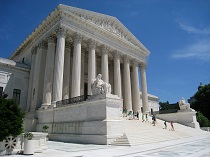
Earlier this month, the Supreme Court agreed to decide 13 more cases this term:
Heffernan v. City of Paterson, New Jersey, is perhaps the most interesting grant for local governments from the Court’s “long” conference. The question in this case is whether an employee can bring a First Amendment retaliation claim when he was incorrectly perceived to have been engaged in political speech. Officer Heffernan was demoted after he was seen picking up a campaign sign for the current police chief’s opponent. But the sign wasn’t for himself; it was for his bedridden mother. Had he been demoted for actually engaging in political speech he would have a First Amendment retaliation claim.
With at least 20 cases more to accept between now and the end of January, what issues of interest to local governments is the Court likely to agree to hear in the near future?
Cell Phone Location Data
When a cell phone is in contact with a cell tower, its interaction with the closest cell tower is recorded. Prosecutors rely on cell site location information (CSLI) to place defendants at crime scenes. The Supreme Court is likely to decide soon whether a warrant is needed to obtain CSLI. In United States v. Davis the Eleventh Circuit held no warrant was required applying the “third party doctrine”; cellphone users have no expectation of privacy regarding information to which third party service providers have access. In United States v. Graham the Fourth Circuit refused to apply the third party doctrine reasoning that “a cell phone user does not ‘convey’ CSLI to her service provider at all – voluntarily or otherwise – and therefore does not assume any risk of disclosure to law enforcement.”
While a circuit split exists, the plot thickens. First, it is possible the entire Fourth Circuit will rehear Graham and rule for the government, dissolving the split. Second, in both cases the courts held that CSLI could be admitted under the good faith exception to the exclusionary rule. In other words, CSLI wasn’t suppressed because police relied in good faith on court orders allowing them to seek CSLI from service providers. The Court may prefer to take a case where the lower courts did not affirm the conviction based on the exclusionary rule.
Excessive Force
So far, the Court has accepted no qualified immunity or Fourth Amendment cases. The Court has relisted (postponed) deciding whether to hear two cases involving both issues in the context of excessive force.
In Mullenix v. Luna, Israel Leija Jr. led police on a high-speed chase and twice called the police saying he had a gun and would shoot police officers. Officers set up tire spikes under an overpass. Officer Mullenix asked dispatch to tell his supervisor he was going to fire at Leija’s car. It is unclear whether Mullenix got his supervisor’s message to wait to see if the spikes worked. Mullenix shot and killed Leija before he hit the spikes.
In Los Angeles v. Contreras, as Robert Contreras fled on foot after attempting to commit a drive-by shooting and leading police on a high-speed chase, he took something out of his front pant pocket that police could not see but believed was a gun. Police shot him after he refused their repeated commands to stop and drop the gun. Police only recovered a cell phone. Contreras survived.
To learn more about the cases the Court has accepted so far affecting the local governments, read the SLLC’s Preview for the Local Governments.
New, Reduced Membership Dues
A new, reduced dues rate is available for CAOs/ACAOs, along with additional discounts for those in smaller communities, has been implemented. Learn more and be sure to join or renew today!
